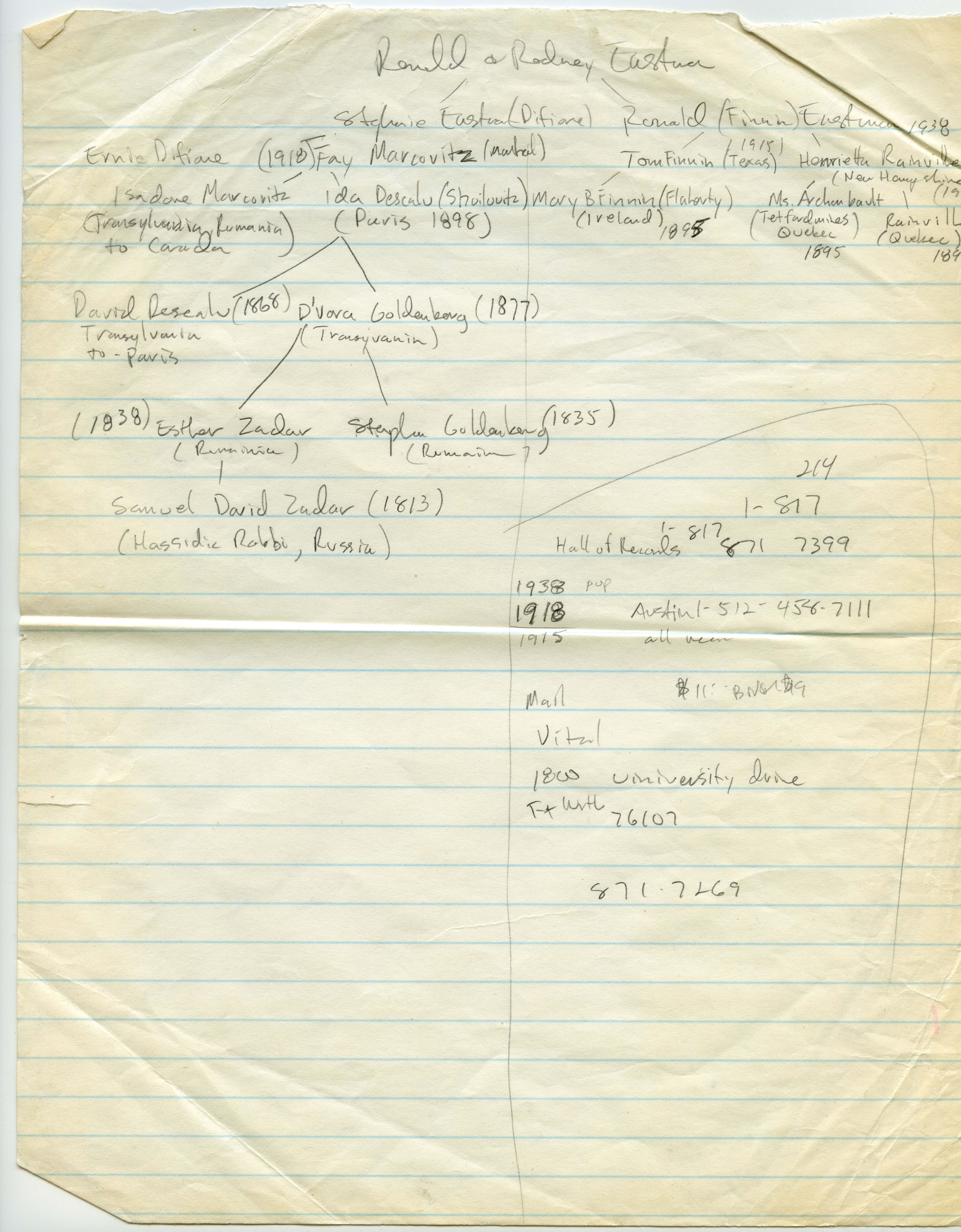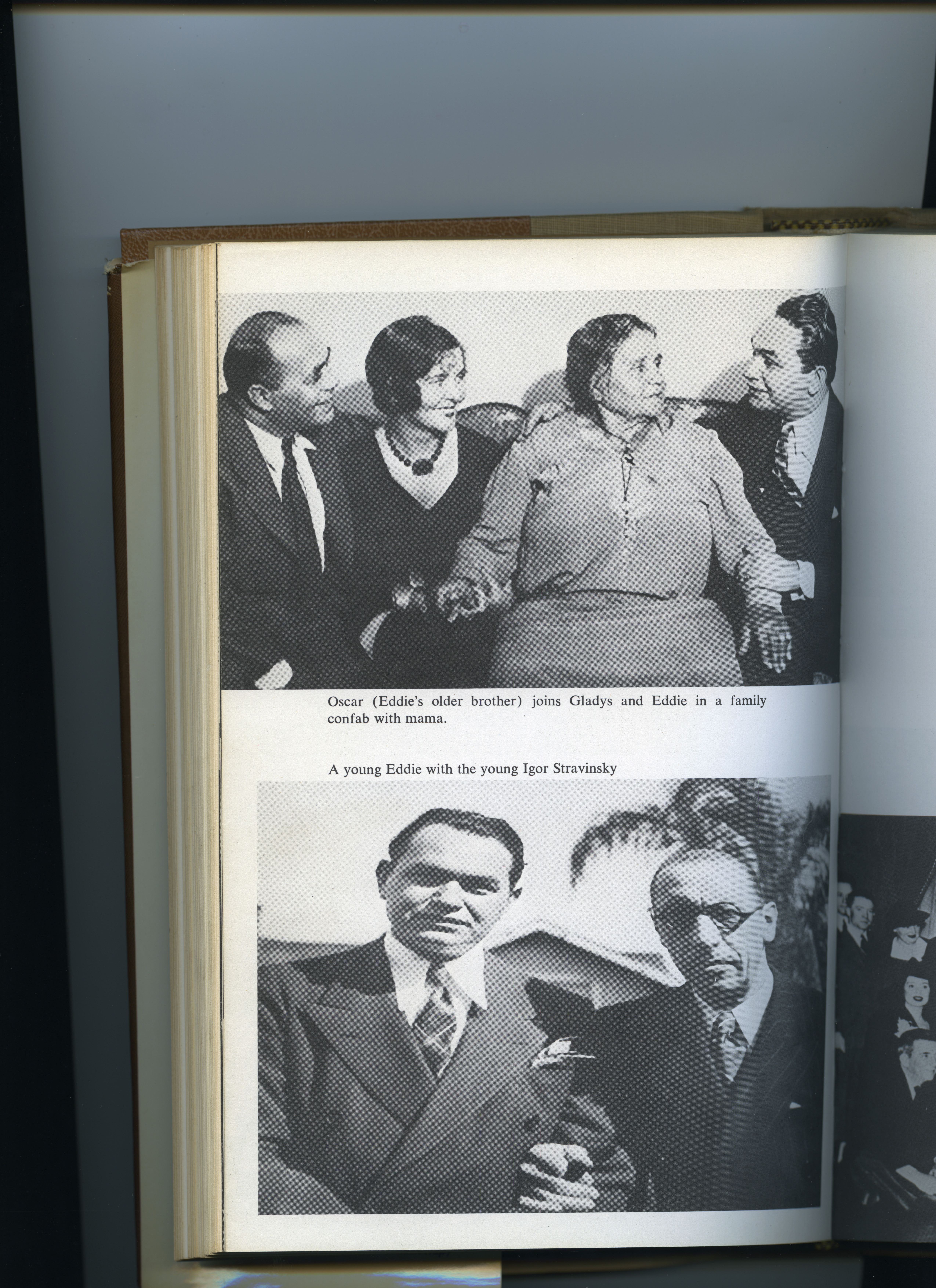


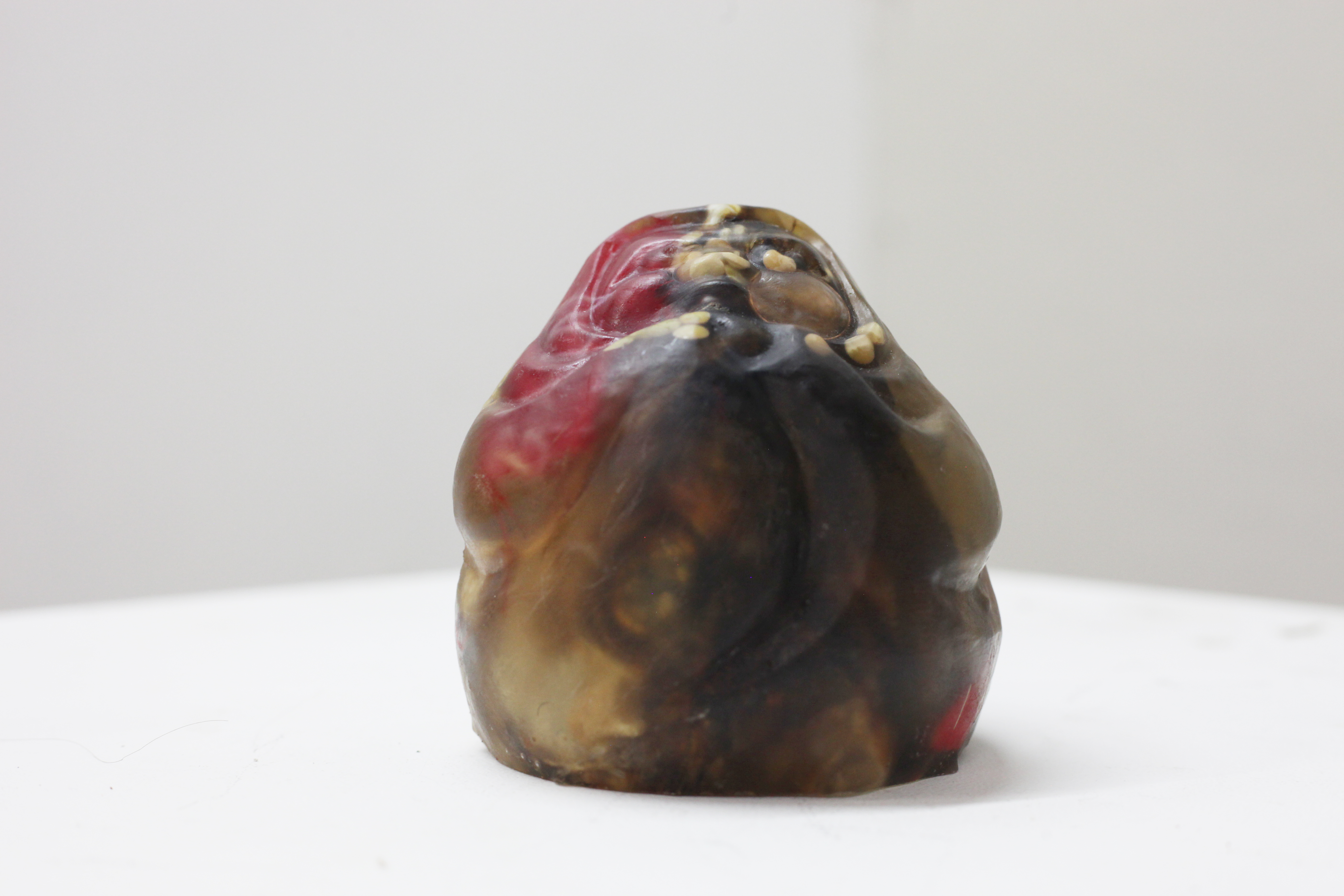
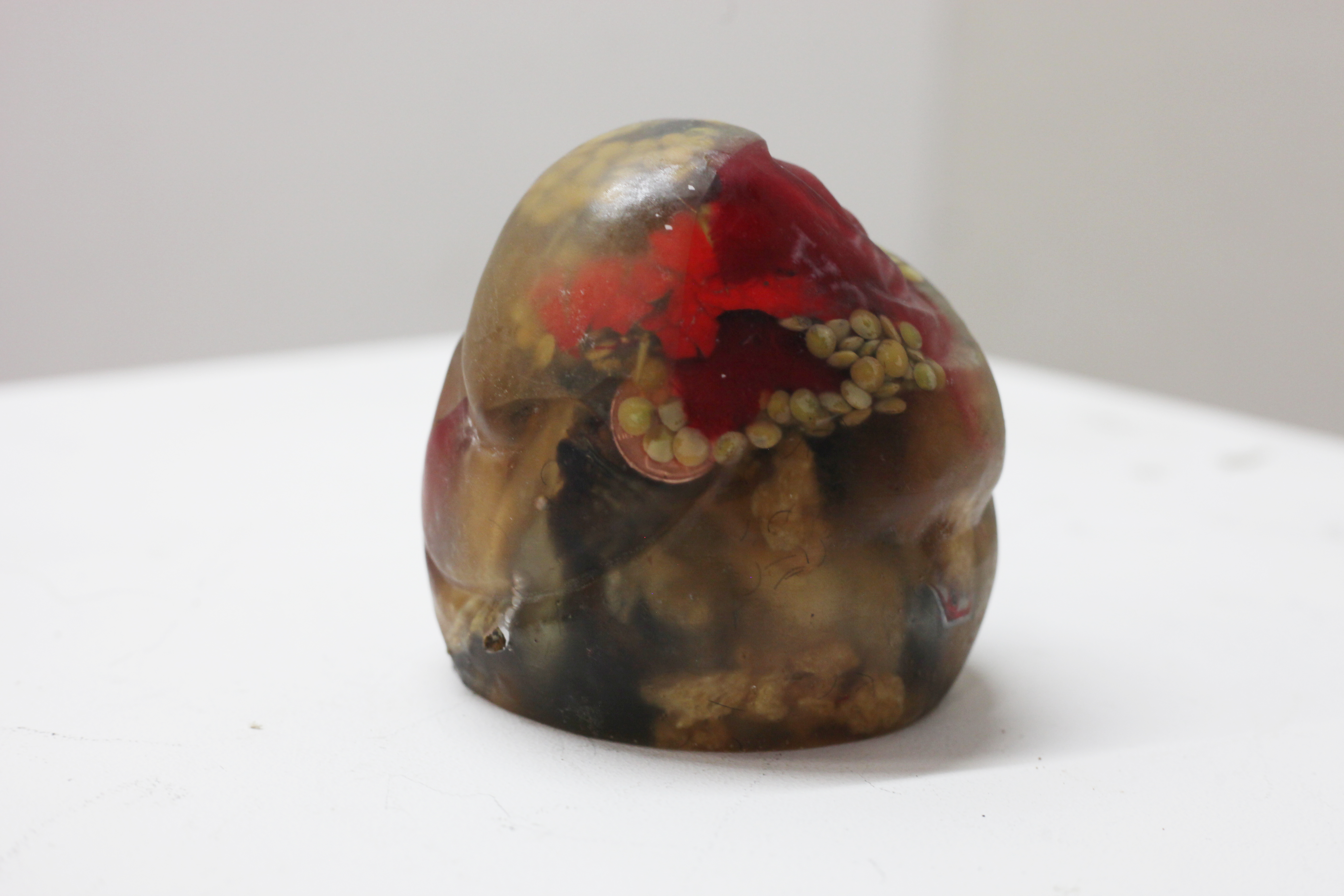
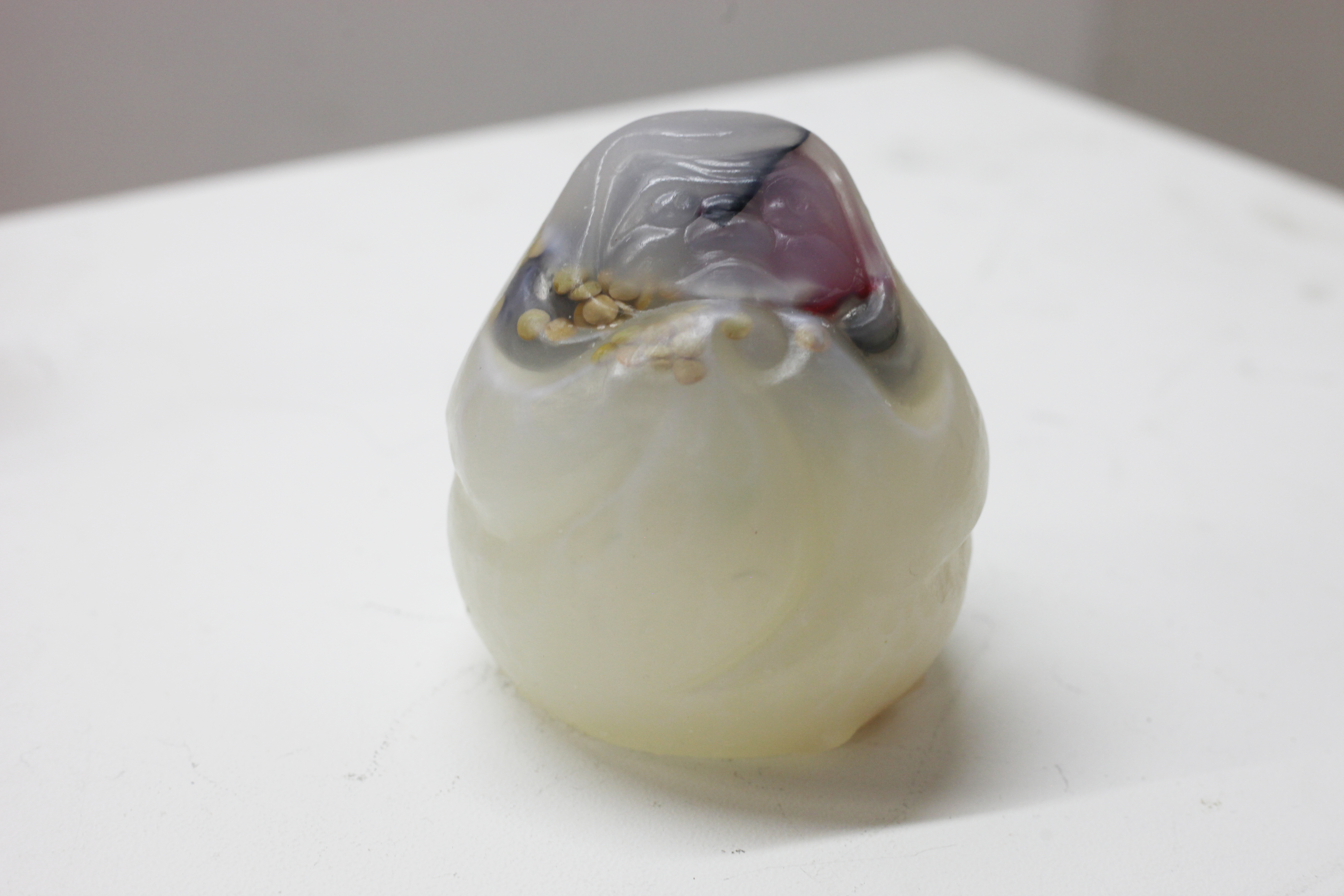


Sol Roth Dathan (2022)
dehydrated soy protein, lentils, urethane, epoxy resin, my father’s MAGA hat, Eastman family deciduous teeth, daruma doll of Shoji Kato, facial hair of Andrew Kato Eastman, retired steel pinballs, copper coated bbs, 1973 penny, 1983 penny, 2022 penny, rabbit fur (Buncakes Eastman), “The Game of Life” instruction manual, mosquitos, cod, Seicho No Ie Holy Sutra.
Soylent Green is a 1973 American ecological dystopian thriller film directed by Richard Fleischer, and starring Charlton Heston, Leigh Taylor-Young, and Edward G. Robinson in his final film role. The story follows a murder investigation in a dystopian future of dying oceans and year-round humidity caused by the greenhouse effect, with the resulting pollution, depleted resources, poverty, and overpopulation.
By 2022, the cumulative effects of overpopulation, pollution and global warming have caused severe worldwide shortages of food, water and housing. New York City has a population of 40 million, and only the elite can afford spacious apartments, clean water, and natural food. The poor live in squalor, haul water from communal spigots, and eat highly processed soy and lentil wafers: Soylent Red, Soylent Yellow, and the latest product, far more flavorful and nutritious, Soylent Green.
NYPD detective Robert Thorn (Heston) lives with his aged friend Sol Roth (Robinson), a brilliant former college professor and police analyst (referred to as a "Book"). Thorn is investigating the murder of the wealthy and influential William R. Simonson, a board member of the Soylent Corporation, which he suspects was an assassination. In researching the case for Thorn, Roth brings two volumes of "Soylent Oceanographic Survey Report, 2015–2019", taken by Thorn from Simonson's apartment, to the team of other "Books" at the Supreme Exchange. The "Books" conclude from the oceanographic reports that the oceans are dying and can no longer produce the plankton from which Soylent Green is made. This information confirms to Sol Roth that Simonson's murder was ordered by his fellow Soylent Corporation board members who knew Simonson was increasingly troubled by the truth and feared he might disclose it to the public.
Roth is so shaken by the truth that he decides to "return to the home of God" and seeks assisted suicide at a government clinic. Thorn rushes to stop him but arrives too late. Before dying, Roth tells his discovery to Thorn. Thorn moves to uncover proof of crimes against humanity and to bring it to the attention of The Supreme Exchange in order that the case be brought to the Council of Nations to take action.
Thorn secretly boards a waste truck transporting human bodies from the euthanasia center to a waste disposal plant where he witnesses human corpses being processed and turned into Soylent Green.

Edward G. Robinson (born Emanuel Goldenberg; December 12, 1893 – January 26, 1973) was a Jewish Romanian-American actor of stage and screen, who was popular during the Hollywood Golden Age. He appeared in 30 Broadway plays and more than 100 films during a 50-year career.
At the time World War II broke out in Europe, he played an FBI agent in Confessions of a Nazi Spy (1939), the first American film that portrayed Nazism as a threat to the United States.
He volunteered for military service in June 1942 but was disqualified due to his age which was 48, although he became an active and vocal critic of fascism and Nazism during that period. His activism included contributing over $250,000 to more than 850 organizations which were involved in war relief, along with contributions to cultural, educational and religious groups. During the 1950s, he was called to testify in front of the House Un-American Activities Committee during the Red Scare, but he was cleared of any deliberate Communist involvement when he claimed that he was "duped" by several people whom he named (including screenwriter Dalton Trumbo, according to the official Congressional record, "Communist infiltration of the Hollywood motion-picture industry"). As a result of being investigated, he found himself on Hollywood's graylist, people who were on the Hollywood blacklist maintained by the major studios, but could find work at minor film studios on what was called Poverty Row.
His career's rehabilitation received a boost in 1954, when the anti-communist film director Cecil B. DeMille cast him as the traitorous Dathan in The Ten Commandments (1956).
Soylent Green was the 101st and final film in which Edward G. Robinson appeared; he died of bladder cancer on January 26, 1973 at Cedars Sinai Hospital in Los Angeles, two months after the completion of filming. In his book The Actor's Life: Journal 1956–1976, Charlton Heston wrote, "He knew while we were shooting, though we did not, that he was terminally ill. He never missed an hour of work, nor was late to a call… I'm still haunted, though, by the knowledge that the very last scene he played in the picture, which he knew was the last day's acting he would ever do, was his death scene. I know why I was so overwhelmingly moved playing it with him". Robinson had previously worked with Heston in The Ten Commandments (1956) and the make-up tests for Planet of the Apes (1968).
Edward G. Robinson is the great grand uncle of Andrew Kato Eastman, 011668.
